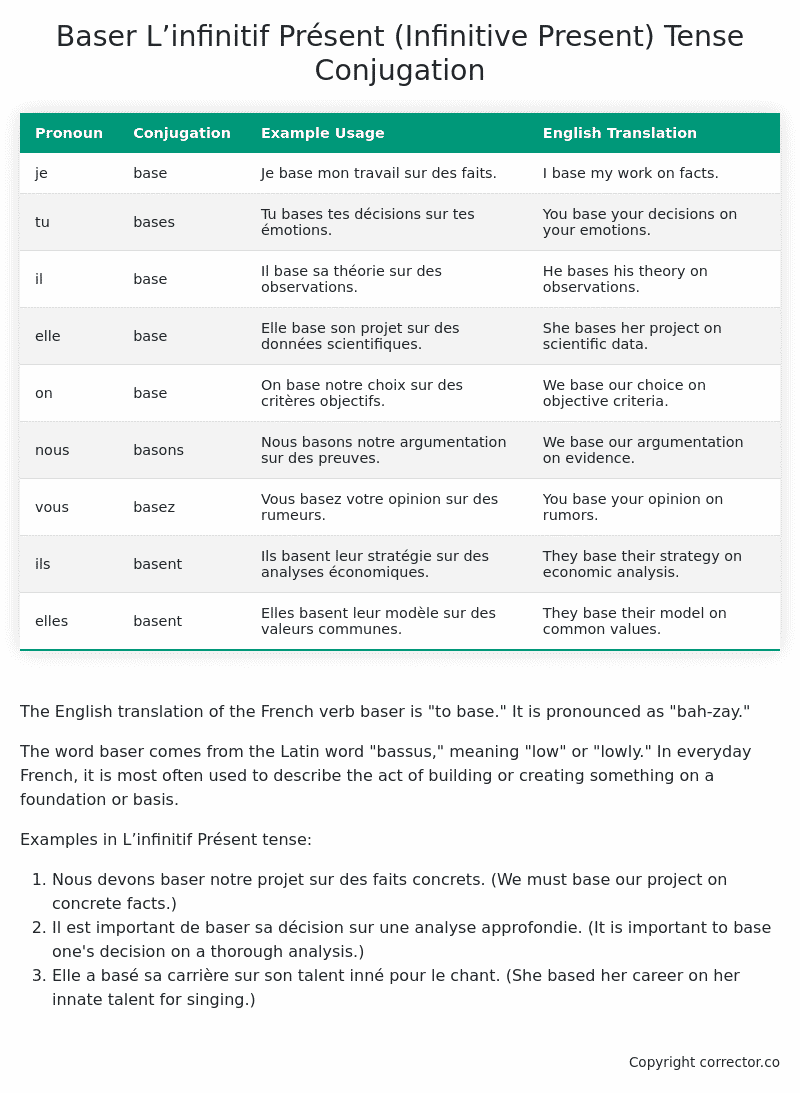L’infinitif Présent (Infinitive Present) Tense Conjugation of the French Verb baser
Introduction to the verb baser
The English translation of the French verb baser is “to base.” It is pronounced as “bah-zay.”
The word baser comes from the Latin word “bassus,” meaning “low” or “lowly.” In everyday French, it is most often used to describe the act of building or creating something on a foundation or basis.
Examples in L’infinitif Présent tense:
- Nous devons baser notre projet sur des faits concrets. (We must base our project on concrete facts.)
- Il est important de baser sa décision sur une analyse approfondie. (It is important to base one’s decision on a thorough analysis.)
- Elle a basé sa carrière sur son talent inné pour le chant. (She based her career on her innate talent for singing.)
Table of the L’infinitif Présent (Infinitive Present) Tense Conjugation of baser
| Pronoun | Conjugation | Example Usage | English Translation |
|---|---|---|---|
| je | base | Je base mon travail sur des faits. | I base my work on facts. |
| tu | bases | Tu bases tes décisions sur tes émotions. | You base your decisions on your emotions. |
| il | base | Il base sa théorie sur des observations. | He bases his theory on observations. |
| elle | base | Elle base son projet sur des données scientifiques. | She bases her project on scientific data. |
| on | base | On base notre choix sur des critères objectifs. | We base our choice on objective criteria. |
| nous | basons | Nous basons notre argumentation sur des preuves. | We base our argumentation on evidence. |
| vous | basez | Vous basez votre opinion sur des rumeurs. | You base your opinion on rumors. |
| ils | basent | Ils basent leur stratégie sur des analyses économiques. | They base their strategy on economic analysis. |
| elles | basent | Elles basent leur modèle sur des valeurs communes. | They base their model on common values. |
Other Conjugations for Baser.
Le Present (Present Tense) Conjugation of the French Verb baser
Imparfait (Imperfect) Tense Conjugation of the French Verb baser
Passé Simple (Simple Past) Tense Conjugation of the French Verb baser
Passé Composé (Present Perfect) Tense Conjugation of the French Verb baser
Futur Simple (Simple Future) Tense Conjugation of the French Verb baser
Futur Proche (Near Future) Tense Conjugation of the French Verb baser
Plus-que-parfait (Pluperfect) Tense Conjugation of the French Verb baser
Passé Antérieur (Past Anterior) Tense Conjugation of the French Verb baser
Futur Antérieur (Future Anterior) Tense Conjugation of the French Verb baser
Subjonctif Présent (Subjunctive Present) Tense Conjugation of the French Verb baser
Subjonctif Passé (Subjunctive Past) Tense Conjugation of the French Verb baser
Subjonctif Imparfait (Subjunctive Imperfect) Tense Conjugation of the French Verb baser
Subjonctif Plus-que-parfait (Subjunctive Pluperfect) Tense Conjugation of the French Verb baser
Conditionnel Présent (Conditional Present) Tense Conjugation of the French Verb baser
Conditionnel Passé (Conditional Past) Tense Conjugation of the French Verb baser
L’impératif Présent (Imperative Present) Tense Conjugation of the French Verb baser
L’infinitif Présent (Infinitive Present) Tense Conjugation of the French Verb baser (this article)
Struggling with French verbs or the language in general? Why not use our free French Grammar Checker – no registration required!
Get a FREE Download Study Sheet of this Conjugation 🔥
Simply right click the image below, click “save image” and get your free reference for the baser L’infinitif Présent tense conjugation!

Baser – About the French L’infinitif Présent (Infinitive Present) Tense
Forming the Infinitive Present
Common Everyday Usage Patterns
As a Verb’s Dictionary Form
After Modal Verbs
As an Imperative
In Infinitive Clauses
Interactions with Other Tenses
Present Tense
Future Tense
Conditional Tense
Passé Composé
Imperfect Tense
Subjunctive and Conditional Moods
Summary
Want More?
I hope you enjoyed this article on the verb baser. Still in a learning mood? Check out another TOTALLY random French verb conjugation!


